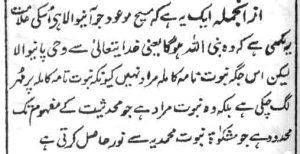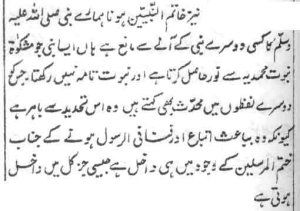Showing Islam is Peaceful • Tolerant • Rational • Inspiring
| Home
|
| 1.
Islam |
| 2.
Ahmadiyya Movement Detailed reply to Qadiani allegations Reply to Qadiani article |
| 3.
Publications & Resources |
An article has appeared on the Qadiani official website in response to our refutation of their beliefs. It is at the page: http://www.alislam.org/true-islam/prophethood.html We have no hesitation in referring our readers to it. We hope (against hope) that the Qadianis will add a link on their website to this reply. The Qadiani response tries to prove that, during the life of Hazrat Mirza Ghulam Ahmad (d. 1908) and afterwards till the Split in 1914, various eminent persons of the Lahore Ahmadiyya Movement used to believe that Hazrat Mirza Ghulam Ahmad was a prophet. In giving quotations from these persons, including Maulana Muhammad Ali, the Qadianis have practised the same kind of misrepresentation and concealment of facts which they do when they present quotations from the writings of Hazrat Mirza Ghulam Ahmad himself. They quote statements where the prophet is used regarding Hazrat Mirza sahib, but they conceal the explanations that occur in Ahmadiyya literature of how and why this term can be applied to him (and not only to him but to other saints of Islam). The Qadianis point to the terms 'prophet' and 'messenger' but leave out the meaning with which they were used and read their own meaning into it. Let us first explain what is the Qadiani concept of Hazrat Mirza Ghulam Ahmad being a prophet. 1. The Qadiani belief is that as Hazrat Mirza Ghulam Ahmad was a prophet therefore all other Muslims who do not believe in him are non-Muslims, just as Christians and Hindus are non-Muslims. The Qadianis believe that a person cannot become a Muslim by proclaiming the well-known Kalima Shahada but that he must, in addition to believing in prophets such as Moses, Jesus and the Holy Prophet Muhammad, also profess and proclaim belief in Hazrat Mirza Ghulam Ahmad as a prophet. 2. The Qadianis have declared as null and void the many statements made by Hazrat Mirza Ghulam Ahmad in which he denied claiming to be a prophet and wrote that the Holy Prophet Muhammad is the Last Prophet after whom no prophet can come. The Qadianis concocted the theory that when Hazrat Mirza sahib was making those statements during the years 1891 to 1901 he did not realize that Allah had in fact made him a prophet, because he misunderstood his own status. According to the Qadianis, Hazrat Mirza discovered in 1901 that he had been wrong in his denials of claiming to be a prophet. This Qadiani concept of Hazrat Mirza sahib being a prophet is totally and entirely different from the sense in which the word 'prophet' was used by Hazrat Mirza sahib and also by other Ahmadi writers before the Split (such as Maulana Muhammad Ali), which was just in a metaphorical sense meaning one who receives revelation. The Lahore Ahmadiyya elders never ever expressed a belief like the Qadiani concept of Hazrat Mirza sahib's prophethood. They never ever said that a person must believe in Hazrat Mirza sahib, as in the prophets like the Holy Prophet Muhammad, in order to be a Muslim, and they never ever said that Hazrat Mirza sahib's denials of claiming to be a prophet had been cancelled. In Islam a person who is a saint (wali) or a non-prophet recipient of revelation (muhaddas) or a reformer (mujaddid) can have the words 'prophet' (nabi), 'messenger' (rasul) or 'sent one' (mursal) applied to him purely in a metaphorical or linguistic or partial sense, without being included in the category of real prophets who appeared from Adam to the Prophet Muhammad. Hazrat Mirza sahib wrote:
"A characteristic of the coming Messiah which is recorded is that he shall be a prophet (nabi) of God, that is, a recipient of revelation from God. But full and perfect prophethood is not meant here, because that has been sealed. Only that prophethood is meant which is limited to the extent of muhaddasiyya (being a muhaddas or non-prophet who receives revelation)." (Izala Auham, p. 701) It was in line with this that the Lahore Ahmadiyya elders (and indeed also Qadiani writers before the Split) referred to the 'prophethood' of Hazrat Mirza sahib, 'prophethood' which only denotes sainthood or God speaking to the non-prophets who arise in Islam, and is NOT the real prophethood of prophets from Adam to the Prophet Muhammad in whose prophethood Muslims must believe and which has been sealed after the Prophet Muhammad. Let us look at Hazrat Mirza sahib's explanations of the sense in which he used the words 'prophet' and 'messenger': He wrote:
It was exactly in the manner explained above that Maulana Muhammad Ali and other Ahmadis before the Split used the words 'prophet' and 'messenger' about Hazrat Mirza sahib. Maulana Muhammad Ali's statementsLet us take the first statement by Maulana Muhammad Ali as quoted in the Qadiani response:
"This Community believes that the Holy Prophet (peace and blessings of Allah be upon him) is Khatamannabiyyin in the true sense. We believe that any nabi (prophet), whether old or new, cannot come by acquiring the status of nabuwwat (prophethood) without the intermediation of the Holy Prophet (peace and blessings of Allah be upon him). After the Holy Prophet (peace and blessings of Allah be upon him), Almighty Allah has closed all doors of nabuwwat (prophethood) and risalats (messengerships), but this door has not been closed for his perfect followers, who follow him completely, and acquire the light of God by fully adopting the color of his perfect morals, because they are a reflection of the same holy and exalted personage. But other Muslims believe the Prophet Isa (peace on him) who passed away six hundred years before him, will return; this belief definitely breaks the seal of Khatme Nabuwwat." (Review of Religions -- Urdu-- May 1908, p. 186). Who is he talking about when he writes: "but this door has not been closed for his perfect followers, who follow him completely, and acquire the light of God by fully adopting the color of his perfect morals, because they are a reflection of the same holy and exalted personage."? The very fact that he is speaking in the plural indicates that he is referring to the saints of the Muslim umma. But more clearly, let us see what Hazrat Mirza sahib himself writes as to who are these perfect followers:
"I firmly believe that our Holy Prophet Muhammad is the Khatam al-anbiya, and after him no prophet shall come for this Umma, neither new nor old. Not a jot or iota of the Holy Quran shall be abrogated. Of course, muhaddases will come who will be spoken to by God, and possess some attributes of full prophethood by way of reflection (zill), and in some ways be coloured with the colour of prophethood. I am one of these." (Nishan Asmani, p. 28) It is a muhaddas, a non-prophet that God speaks to, who is described as reflecting prophethood and being coloured with it. Hazrat Mirza sahib, using the same words "reflecting" and "colour" as Maulana Muhammad Ali, says that these persons are muhaddases and that he himself is "one of these". Then the Qadiani response gives quotations from Maulana Muhammad Ali where he describes Hazrat Mirza sahib in the following words: "The one at whose hand we pledged allegiance was true, he was a chosen and exalted rasul (messenger)" "... a man, who is a supporter of Islam and makes a claim of risalat (messengership), and is establishing the truthfulness of Islam all over the world" "Therefore, at this time Almighty Allah sent a mursal (messenger); and it is the same prophet that had been, from the beginning, prophesied to appear in latter days. Because He who had made the promise knew that a mursal (messenger) would be needed in latter days." Again these words do not denote a prophet. As Hazrat Mirza Ghulam Ahmad explained in many places:
Who is "such a prophet"?Another quotation from Maulana Muhammad Ali is given, whose opening and closing part we show below:
"Such a nabi (prophet) has been raised by Almighty Allah at this time. But people denied his truthfulness, just as they had denied the truthfulness of the earlier ones. ... Such a nabi (prophet) is Mirza Ghulam Ahmad of Qadian." (Review of Religions Vol. 3, No. 7 July 1904, p. 248) Who is "such a nabi"? Hazrat Mirza sahib writes:
"The fact that our Holy Prophet is the Khatam an-nabiyyin prohibits the coming of any other prophet. However, such a prophet as obtains light from the lamp of the prophethood of Muhammad, and does not possess full prophethood, who in other words is also called a muhaddas, is exempt from this restriction because, due to his obedience to the Holy Prophet and due to his being fana fir-rasul, he is included within the person of the Last of the Messengers, just as a part is included in the whole." (Izala Auham, p. 575) "Such a prophet" is none other than a muhaddas. |

